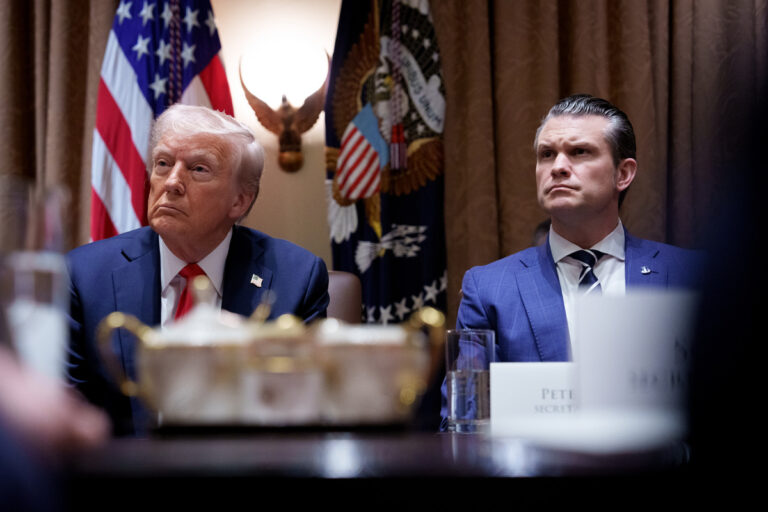The White House has insisted no classified information was shared on messaging platform Signal after reports emerged that U.S. Secretary of Defense Pete Hegseth shared information about upcoming military strikes in a second group chat that included his wife and brother.
Why It Matters
John Ullyot, the former senior Defense Department (DOD) spokesperson who resigned last week, said in an opinion piece published by Politico on Saturday that it is “hard to see” Hegseth remaining in his position for much longer after presiding over “a month of total chaos at the Pentagon.”
Dogged criticism has followed Hegseth during his first few months in the DOD, with the head of the U.S.’s biggest employer staring down increasing calls for his dismissal at a moment when the world watches on closely at how President Donald Trump’s administration is steering defense policy.

Photo by Andrew Harnik/Getty Images
What To Know
Trump’s top defense official shared flight schedules for U.S. military F/A-18 Hornets targeting Houthi rebels in Yemen in a Signal group chat on the same day he included attack plans in a separate group chat that had mistakenly added the editor of The Atlantic, according to a Saturday report by The New York Times.
The group chat included Hegseth’s wife, a former producer for Fox News, his brother and his personal lawyer, the newspaper reported, citing four people with knowledge of the matter. The Wall Street Journal reported in late March the defense secretary had brought his wife, Jennifer, to two meetings with foreign officials where sensitive information was relayed.
Hegseth’s brother, Phil, and the defense secretary’s personal lawyer, Tim Parlatore, both work at the Pentagon, but it is not clear why they would be included in discussions on upcoming Middle East strikes, the Times reported.
Trump’s national security adviser, Mike Waltz, previously said he took “full responsibility” for creating a Signal group chat named “Houthi PC small group” in mid-March, to which the editor-in-chief of The Atlantic, Jeffrey Goldberg, was mistakenly added. The chat included Hegseth, Vice President JD Vance, the Director of National Intelligence, Tulsi Gabbard, and a host of the most senior national security officials.
Senior Trump officials denied at the time classified information was shared on the chat, although this was met by skepticism by analysts and critics of the defense secretary. The Pentagon’s inspector general has launched an investigation into possible classified information leaks over military plans in Yemen.
“No matter how many times the legacy media tries to resurrect the same non-story, they can’t change the fact that no classified information was shared,” White House deputy press secretary, Anna Kelly, said in a statement carried by multiple outlets.
The previously unreported Signal chat, containing 13 members, was created in January by Hegseth using his private phone before he was confirmed as secretary of defense, according to the Times. The chat was mostly used for scheduling or administrative matters, two people familiar with the group told the newspaper, adding it was not used to discuss sensitive military operations.
The chat was reportedly named “Defense | Team Huddle.”
Hegseth shared information on the “Defense | Team Huddle” group chat about the Yemen strikes at approximately the same time that he shared details of the attacks on Houthi militants in the “Houthi PC small group” chat, according to the report.
The chat had reportedly included senior Pentagon adviser Dan Caldwell and Deputy chief of staff Darin Selnick.
Caldwell and Selnick, along with Colin Carroll—a former chief of staff to Deputy Defense Secretary Stephen Feinberg—had worked as senior Pentagon aides before they were fired last week under accusations of leaking information without authorization.
A memo signed by Joe Kasper, Hegseth’s chief of staff, dated March 21, requested a probe into what Kasper called “recent unauthorized disclosures of national security information involving sensitive communications.”
The three former aides said in a joint statement on Friday they were “incredibly disappointed by the manner in which our service at the Department of Defense ended,” and claimed anonymous Pentagon officials “slandered our character with baseless attacks on our way out the door.”
“We still have not been told what exactly we were investigated for, if there is still an active investigation, or if there was even a real investigation of ‘leaks’ to begin with,” the statement read.
Kelly, the White House deputy press secretary, said “recently-fired ‘leakers’ are continuing to misrepresent the truth to soothe their shattered egos and undermine the president’s agenda, but the administration will continue to hold them accountable.”
Ullyot said in his opinion piece published on Saturday that unnamed Pentagon officials working for Hegseth “tried to smear the aides anonymously to reporters,” accusing the defense secretary’s team of “spreading flat-out, easily debunked falsehoods anonymously about their colleagues on their way out the door.”
Politico has reported that Kasper will leave his position in the next few days.
“In short, the building is in disarray under Hegseth’s leadership,” Ullyot said.
Senate Democratic Leader Chuck Schumer called for Hegseth’s resignation on Saturday, posting to social media: “The details keep coming out. We keep learning how Pete Hegseth put lives at risk. But Trump is still too weak to fire him.”
Democrat Representative for New York, Jerry Nadler called for Republicans to join calls for Hegseth’s resignation.
What People Are Saying
Chief Pentagon spokesperson, Sean Parnell, said in a post to social media on Saturday: “Another day, another old story—back from the dead.” He added his statement that there “was no classified information in any Signal chat, no matter how many ways they try to write the story.”
Update 4/21/2025 5:20 a.m. ET: This article has been updated with additional information.


